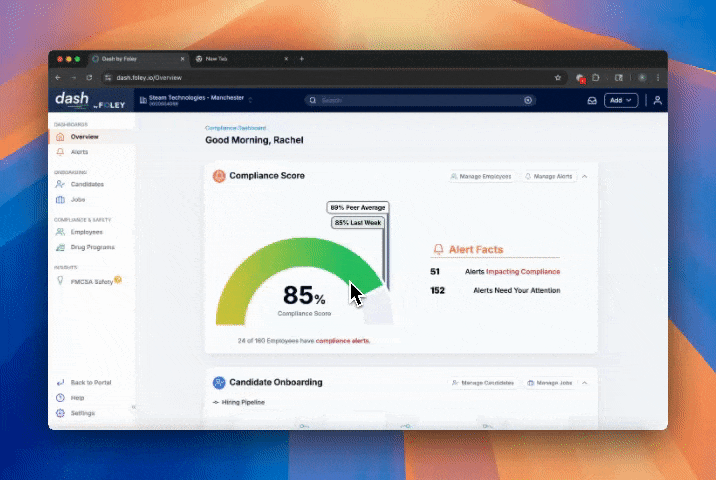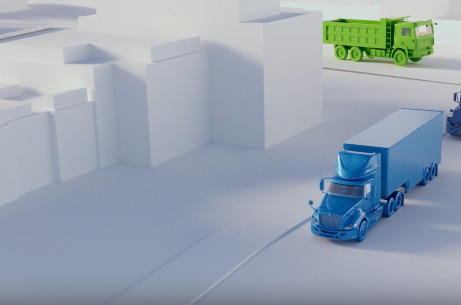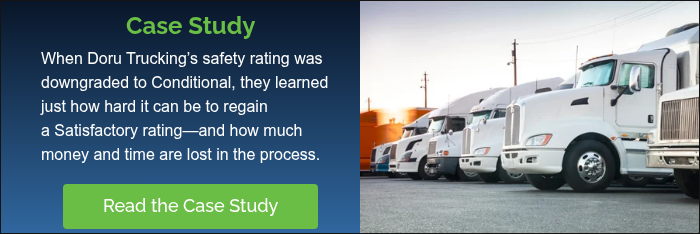Understanding the Difference Between MVR and PSP Reports
.png)
Ensuring DOT Compliance with Accurate Driver Screening
Both Motor Vehicle Records (MVR) and Pre-Employment Screening Program (PSP) reports are crucial tools for ensuring compliance with Department of Transportation (DOT) regulations, but they serve distinct purposes and provide different types of information. In this blog post, we'll explore the key differences between MVR and PSP reports, their significance in the hiring process, and how they help organizations maintain a safe and compliant fleet.
What is a Motor Vehicle Record (MVR)?
A Motor Vehicle Record (MVR) is a report that provides a driver's history, including their license status, traffic violations, and accidents. MVR reports can help you identify high-risk candidates and drivers and make smarter hiring decisions, and regular checks can help you keep tabs on your drivers' habits so you can take corrective action, if ever needed.
IMPORTANT NOTE: The Federal Motor Carrier Safety Administration (FMCSA) requires annual Motor Vehicle Record checks for all drivers of commercial motor vehicles, and this applies nationwide in all states.
MVRs are typically obtained from state motor vehicle agencies and are used by employers to screen potential drivers and ensure they meet the necessary qualifications. The information contained in an MVR can vary by state, but it generally includes:
-
Driver's license status
-
Traffic convictions
-
Accidents
-
License suspensions or revocations
IMPORTANT NOTE: Since an MVR check is a consumer report, employers must comply with the Fair Credit Reporting Act, including disclosure and authorization requirements and adverse action procedures.
An Aside on Continuous MVR Monitoring
While an MVR is a static report that captures a driver’s history at a single point in time, MVR monitoring goes a step further by continuously tracking each driver’s motor vehicle record. With monitoring in place, any changes—often called “hits”—trigger a new report that is uploaded, scanned for accuracy, and followed by an immediate notification.
By law, MVRs only need to be pulled once a year, but a lot can happen in 12 months. Without monitoring, an employer might not learn about violations or incidents until the next annual report. A monitoring program ensures that any updates are captured in real time, providing a much more proactive approach.
A PSP, on the other hand, is only pulled during the hiring process. It is continually updated through the MCMIS, so when a driver changes jobs, the new employer can access the most current record of that driver’s safety and inspection history.
What is a Pre-Employment Screening Program (PSP) Report?
A Pre-Employment Screening Program (PSP) report, on the other hand, is a comprehensive report that provides a driver's safety history, including data from the DOT's Motor Carrier Management Information System (MCMIS). PSP reports are designed to help employers make informed hiring decisions by providing a more detailed picture of a driver's safety record. A PSP report typically includes:
-
Driver's identification information
-
Safety ratings
-
Five years of crash data
-
Three years of roadside inspection history
-
Violations
NOTE: A PSP is not federally mandated by the DOT. The FMCSA makes it available, but employers can choose whether to order a PSP report when screening a driver.
Key Differences Between MVR and PSP Reports
While both MVR and PSP reports are used to screen drivers, there are significant differences between the two:
-
Source of Information: MVRs are obtained from state motor vehicle agencies, while PSP reports are generated from the DOT's MCMIS database.
-
Scope of Information: MVRs provide a more limited view of a driver's history, focusing on license status and traffic violations. PSP reports, by contrast, offer a more comprehensive picture of a driver's safety record, including crash data and inspection history.
-
Purpose: MVRs are typically used to verify a driver's qualifications and ensure compliance with state regulations. PSP reports are used to assess a driver's safety risk and make informed hiring decisions.
Why Both MVR and PSP Reports are Essential for Compliance
To ensure DOT compliance, organizations must use both MVR and PSP reports as part of their driver screening process. Here's why:
-
Comprehensive Screening: Using both MVR and PSP reports provides a more complete picture of a driver's history and safety record.
-
Regulatory Compliance: The DOT requires employers to review a driver's PSP report before hiring them, and to maintain accurate records of their safety performance.
-
Risk Management: By using both MVR and PSP reports, organizations can better assess a driver's safety risk and make informed decisions about their hiring and retention.
Best Practices for Using MVR and PSP Reports
To get the most out of MVR and PSP reports, organizations should:
-
Use both reports: Combine MVR and PSP reports to get a comprehensive view of a driver's history and safety record.
-
Verify driver information: Ensure that driver information is accurate and up-to-date to avoid errors or discrepancies.
-
Maintain accurate records: Keep accurate records of driver safety performance, including MVR and PSP reports.
By understanding the differences between MVR and PSP reports, and using both as part of a comprehensive driver screening process, organizations can ensure DOT compliance, reduce risk, and maintain a safe and compliant fleet.
Your Compliance Partner
At Foley, we're committed to helping organizations navigate the complexities of DOT regulations and maintain a strong compliance posture. We offer multiple platform packages designed to meet the needs of commercial fleets of all sizes with a range of screening solutions, including MVRs, PSPs, CSA monitoring, and more.
If you have questions about MVR and PSP reports, or need guidance on ensuring DOT compliance, we're here to help. Contact us to speak with a compliance expert today.
Related Articles
September 2025: What’s New in Safety & Compliance for Fleet Managers
How to Reduce Driver Turnover
Three Reasons Why Your Drivers Should Pass DOT Physicals Before Summer 2023
.png)



